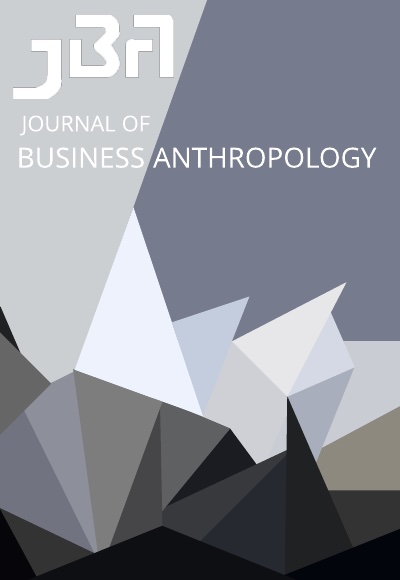In Search of Newness
DOI:
https://doi.org/10.22439/jba.v12i2.7066References
Benedict, R. (1932). “Configurations of Culture in North America.” American Anthropologist 34(1): 1-27. https://doi.org/10.1525/aa.1932.34.1.02a00020
Brandt, A. L. and Vangkilde, K. T. (2023). ”A Game of Futures: The Strategy of Scenarios in a Danish Medical Company.” Culture and Organization (e-pub ahead of print): 1-18. https://doi.org/10.1080/14759551.2023.2253954
Briody, E. K. and Stewart, A. (2019). “Entrepreneurship: A Challenging, Fruitful Domain for Ethnography.” Journal of Business Anthropology 8(2): 141-166. https://doi.org/10.22439/jba.v8i2.5846
Garsten, C. and Sörbom, A. (2021). “Future by Design: Seductive Technologies of Anticipation within the Future Industry.” In S. Kemp and J. Andersson (eds.), Futures (pp. 501-513). Oxford. Oxford University Press. https://doi.org/10.1093/oxfordhb/9780198806820.013.29
Hamel, G. (1999). “Bringing Silicon Valley Inside.” Harvard Business Review (Sept.-Oct.): 71-84.
Hastrup, K. (2007). “Performing the World: Agency, Anticipation and Creativity.” In E. Hallam and T. Ingold (eds.), Creativity and Cultural Improvisation (pp. 193-206). Oxford & New York: Berg. https://doi.org/10.4324/9781003135531-15
Jeanes, E. L. (2006). “’Resisting Creativity, Creating the New'. A Deleuzian Perspective on Creativity.” Creativity and Innovation Management 15(2): 127-134. https://doi.org/10.1111/j.1467-8691.2006.00379.x
Lex, Simon (2016). “In Search of Innovation: Operating with the Future as Working Imperative.” Human Organization 75(3): 230-238. https://doi.org/10.17730/1938-3525-75.3.230
Liep, J. (2001). Locating Cultural Creativity. London: Pluto Press.
Mikkelsen, N. S. and Vangkilde, K. T. (2021). “The Hygienic Problem of Social Innovation Work: Reversibility and Oscillations between ‘the Social’ and ‘the Economic’.” Anthropology of Work Review 42(1): 47-56. https://doi.org/10.1111/awr.12218
Moeran, B. (2014). The Business of Creativity: Toward an Anthropology of Worth. London & New York: Routledge.
Moeran, B. and Christensen, B. T. (2013). Exploring Creativity: Evaluative Practices in Innovation, Design, and the Arts. Cambridge: Cambridge University Press. https://doi.org/10.1017/CBO9781139519724
Murphy, K. M. (2016). ”Anthropology and Design.” Annual Review of Anthropology 45: 433-449. https://doi.org/10.1146/annurev-anthro-102215-100224
Peluso, D. M. (2017). “The Ethnography of versus for Question in an Anthropology of/for Business.” Journal of Business Anthropology 6(1): 8-23. https://doi.org/10.22439/jba.v6i1.5315
Pfeilstetter, R. (2021). The Anthropology of Entrepreneurship: Cultural History, Global Ethnographies, Theorizing Agency. London & New York: Routledge. https://doi.org/10.4324/9780367824136
Salazar, J. F., Pink, S., Irving, A., and Sjöberg, J. (2017). Anthropologies and Futures: Researching Emerging and Uncertain Worlds. London & New York: Bloomsbury.
Smith, R. C., Vangkilde, K. T., Kjærsgaard, M. G., Otto, T., Halse, J., and Binder, T. (eds.), Design Anthropological Futures. London & New York: Bloomsbury.
Vangkilde, K. T. (2015). “Possessed by the Zeitgeist: Inspiration and Prophecy in the Business of Fashion.” Journal of Business Anthropology 4(2): 178-200. https://doi.org/10.22439/jba.v4i2.4890
Woolgar, S. (1998). “A New Theory of Innovation?” Prometheus 16(4): 441-452. https://doi.org/10.1080/08109029808629293
Downloads
Published
Issue
Section
License
Copyright (c) 2023 Kasper Tang Vangkilde, Samantha Dawn Breslin, Simon Lex

This work is licensed under a Creative Commons Attribution-NonCommercial-NoDerivatives 4.0 International License.
Authors who publish with this journal agree to the following terms:
- Authors retain copyright and grant the journal right of first publication with the work simultaneously licensed under a Creative Commons Attribution License that allows others to share the work with an acknowledgement of the work's authorship and initial publication in this journal.
- Authors are able to enter into separate, additional contractual arrangements for the non-exclusive distribution of the journal's published version of the work (e.g., post it to an institutional repository or publish it in a book), with an acknowledgement of its initial publication in this journal.
- Authors are permitted and encouraged to post their work online (e.g., in institutional repositories or on their website) prior to and during the submission process, as it can lead to productive exchanges, as well as earlier and greater citation of published work (See The Effect of Open Access).



